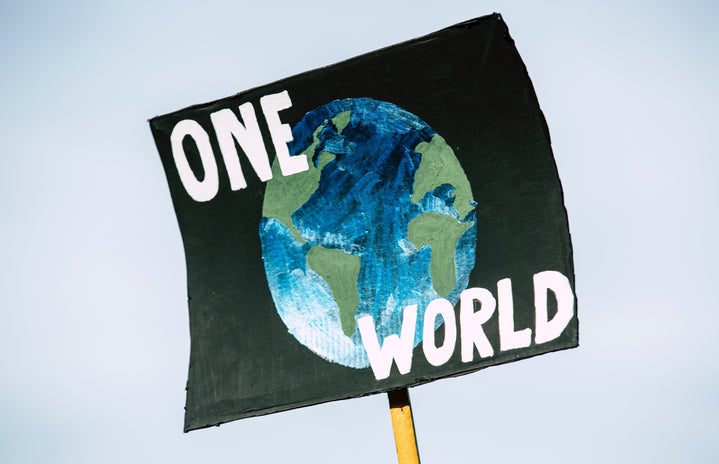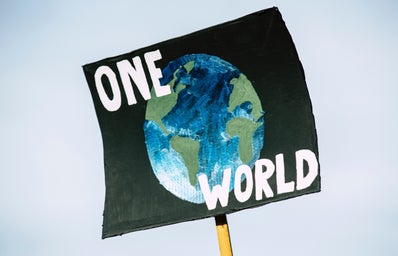If you’re lucky enough to have Netflix, you’ve possibly seen the recently released documentary “A Life on our Planet” starring the incredible David Attenborough. If you haven’t seen it yet, watch it ASAP. If you’ve watched it (and if you’re human), it might’ve left you feeling quite a lot of emotions, including possibly a little bit of guilt. In recent years, there’s been a lot of pressure put by the media on us all to start living much more sustainable lives, which isn’t necessarily a bad thing. But, increasingly there seem to be questions coming at us from every single direction regarding every aspect of our lives as to why we’re ruining the environment, and a strong emphasis on the need to strive toward utopian lives that epitomise zero waste and zero carbon existence. So why is this not only a completely unrealistic, but also a deeply unjust expectation of each other and ourselves?
Well, let’s start with eating a sustainable diet. There’s the obvious choice that often pops up in the media: vegetarianism or veganism. Vegetarian/vegan diets have been shown to have much lower carbon footprints than diets inclusive of meat and dairy. I, myself, am vegetarian. Some aspects of these diets, however, still receive huge criticism for being far less than green and ethical. For instance, if you’re cutting out/decreasing your meat intake purely for environmental reasons, it might be better to buy meat from your local butcher’s or local farm than eating jackfruit (albeit a delicious meat substitute). As jackfruit is a relatively new discovery in the Western world, there are a lot of information gaps on how this fruit may harm the environment. So, maybe you decided to eat a little less meat and dairy. Great! Now for the rest of the plate: you might start trying to opt for more sustainable and ethical brands when stocking up your cupboards. The problem is, the brands marketing themselves as ethical/sustainable are often telling you half the story, or are owned by an unethical, unsustainable conglomerate. Take Cadbury as an example. If you’ve ever bought from them, you might’ve seen the little “Cocoa Life” label, which refers to Cadbury’s goal to help cocoa farmers and “cocoa communities build their own future”. Fantastic! Except Mondelez, the conglomerate that owns Cadbury, managed to avoid a stinking £35million tax bill by offsetting its profits in 2017. So maybe you start branching out, only shopping at the local farmer’s market, organic shop, anything to stop contributing to these companies. But ouch, that starts to leave a hole in your wallet pretty quickly. So it comes down to finding an impossible balance: what are you willing to accept?
So, what about clothing? Business Insider says that fast fashion contributes to 10% of all carbon emissions produced by people; further, it consumes huge amounts of water, pumping harmful pollutants and hundreds of microplastics into the environment. You might’ve seen the Extinction Rebellion protests cropping up in the news this year, some specifically targeting emissions caused by the fast fashion industry. Clearly we’ve got to do something differently. So, if you can afford to, maybe you swap to sustainable alternatives, such as Charlie Feist, who creates bags out of reclaimed plastic bottles, or Minga London, whose ethical code of conduct and sustainable pledges certainly outrank the carelessness of fast fashion. But maybe you can’t afford to. So you switch to thrifting, charity shopping, and the like. On the one hand, that’s amazing: in doing something as everyday and mundane as buying clothes, you can put money into the pockets of charities and non-profit organisations, rather than those of billionaires who aren’t paying their taxes. Then your problem is slightly different. As thrifting and sites like Depop have become more and more popular, they have also become incredibly gentrified, meaning that the people the market was created for (those who don’t have access to much of the fast fashion market) are being pushed out of it. So, where can you even buy clothes without being faced with some ethical consumerism issue? If you’ve got the skills, maybe you can make them yourself. But then, where does the fabric come from?… What is it made out of?… Are those synthetics?…
Surely we can be safe with the age-old adage: Reduce, Reuse, Recycle? Nope. Not even close. For one thing, not everything that’s sent to be recycled gets recycled. Which does put everything we learned in primary school into a pretty bleak perspective. Maybe you’ve started to carry a reusable coffee cup everywhere; maybe you take a Tupperware to collect takeaways in; maybe you compost your food waste. But what about every time you buy everyday essentials like spices? Some shops, such as a Waitrose in Botley, Oxford, allow you to take a reusable container to decant spice into (and then pay for said spice!). These aren’t everywhere though and there isn’t always the market or infrastructure to support one being there. Moreover, this perhaps represents a form of sustainable progress that only extends to those who can afford to shop at Waitrose. How much waste are you willing to produce?
So what can you really do? And seriously, how the hell can we be expected to think about all of these things? How can we really be expected to bear the weight of every consumer decision we make when we’re ultimately powerless to even make effective sustainable and ethical decisions? Why are consumers expected to track their carbon footprint and shoulder the guilt of and responsibility for it, so that the very corporations creating those emissions can avoid accountability for their unsustainable and unethical practices? It’s a little known fact that the individual carbon footprint was actually created by BP, in order to absolve themselves from their environmental responsibilities. Seriously! It’s a textbook example of villainous PR deception. It’s practically cartoonish. This narrative is pushed onto the consumer in order to distract from the corporations themselves. And it works.
Maybe there are things we all need to take responsibility for. Take everything in moderation. Cut out a little bit of meat and dairy. Next time you do want to revamp your look, use thrift shops and charity shops before going straight for the fast fashion option. Carry a reusable water bottle with you, rather than buying a fresh one every time you go out.
What’s the most practical thing you can really do though? Vote. Vote, vote, vote. Contact your local MP and tell them which causes you’re passionate about (if you’re Leeds based you can find your constituency and MP at this link). Go to protests. Join action groups. The best way for you to demand change is to scream for it.
Words By: Gina Moran
Edited By: Nina Bitkowska


